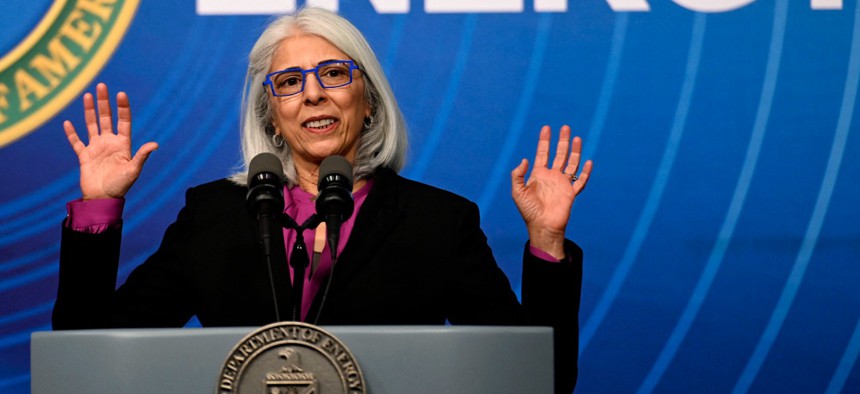
Arati Prabhakar, director of the White House Office of Science and Technology Policy, during a press conference on Dec. 13, 2022. The new scientific integrity policy largely follows guidelines put forward last year by Biden’s Scientific Integrity Task Force. OLIVIER DOULIERY/AFP via Getty Images
Biden’s New Policy to Protect Federal Scientists May Lack Teeth to Prevent Retaliation
The federal science community is concerned that the Biden administration is "blowing it" in its efforts to shield employees from undue influence and political retribution.
The Biden administration has provided a framework for agencies to better protect their scientists from political influence or retribution, but their advocates are warning the blueprint still leaves career employees vulnerable to improper treatment.
The White House’s Office of Science and Technology Policy unveiled its model scientific integrity policy last month, which included steps for every federal agency to take to ensure research is conducted freely and science and data are presented without bias. The document largely follows guidelines put forward last year by Biden’s Scientific Integrity Task Force, which called on agencies to institute robust protections for civil servants and clear punishments for any violators of agency policies. Multiple outside groups that support and defend federal scientists, however, have said the framework is too vague and fails to ensure accountability.
The framework forms a subcommittee on scientific integrity—made up of career officials—within the National Science Technology Council, creates metrics against which agencies should track their policies and standardizes definitions across the government.
To Public Employees for Environmental Responsibility, however, the Biden administration erred in not identifying specific, new procedures to guarantee career scientists would not face retaliation for presenting findings that may conflict with an administration’s agenda. The model policy OSTP presented called on agencies to investigate allegations of integrity policy violations and “enforce administrative actions” when appropriate. Agencies should protect those who report violations and prevent coercion to alter scientific data or professional opinions, the White House office said, and abide by existing whistleblower laws.
PEER said scientists are either already protected by such provisions if they face reprisal for reporting scientific integrity policy violations, or remain vulnerable when “conducting research or publishing on controversial issues or filing dissenting opinions.” Those employees are not coming forward with any violations or reports of waste, fraud or abuse and are therefore not whistleblowers. The new policy, PEER said, does little to address that gap.
President Obama first issued a memorandum on scientific integrity in 2009, but critics have since said the directive did not go far enough, lacked specificity and was inconsistently implemented. Paula Dinerstein, PEER’s general counsel, said the Biden administration was repeating some of those same mistakes.
“In the past, agencies could suppress unwelcome scientific research and blackball the researcher because there was no rule against it,” Dinerstein said. “The White House has the opportunity to create enforceable safeguards for scientific integrity but appears to be blowing it again.”
President Biden launched his review of the government’s protections for scientists shortly after taking office, creating a task force made up of several dozen scientists from across government. Headed by OSTP, Biden tasked the panel with devising ways to better combat political interference in the scientific work by federal agencies’ career employees. In addition to reviewing each agency’s policy for protecting against interference, the task force examined what went wrong in recent years.
Jacob Carter, a research director with the Union of Concerned Scientists, largely praised the new framework, calling it a “great step for science.” He, too, however, took issue with the administration’s failure to articulate consequences for violators. OSTP called for policies to be taken seriously and for transgressions to be responded to appropriately, but it did not detail what that should look like.
“While the framework is great on many scientific integrity issues, it is weak in detailing accountability and enforcement,” Carter said. “This means that agencies are left to use their discretion when it comes to accountability, which did not work well under the prior administration.”
An OSTP spokesperson declined to respond to specific criticisms, but noted its work with agencies on implementation of the framework is ongoing.
“OSTP is working with federal departments and agencies to ensure that federal scientific integrity policies and practices support scientific communication with the media and the public, including the timely release of scientific information," the spokesperson said. "The OSTP Scientific Integrity Framework lays out a pathway for all federal agencies to do just that by strengthening their scientific integrity policies and practices, and run thorough and responsible internal processes, to ensure that scientific information communicated to the public is always reliable—including ensuring that federal scientists can fully participate and communicate scientific information, free of interference.”
Carter called on Congress to take legislative action to shore up the weaknesses of the policy. Rep. Paul Tonko, D-N.Y., who has previously introduced legislation to codify scientific integrity policies at federal agencies, vowed to work with the Biden administration to add teeth to the framework.
“To ensure the integrity of public science, strong enforcement mechanisms must be put in place to protect scientists from retaliation for presenting their findings,” Tonko told Government Executive. “I’m encouraged by the Biden administration’s progress on this critical issue, and my office and I are working closely with the White House and OSTP to strengthen these enforcement mechanisms and make certain these standards are protected by the full force of law.”







